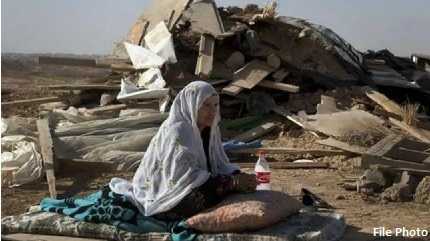
24 Jan 2023; MEMO: The Israeli Forces demolished, on Tuesday, the Palestinian Bedouin village of Al-Araqeeb, in the Negev region in southern Israel, for the 212th time, Anadolu News Agency reported, citing local sources.
Eyewitnesses said Israeli bulldozers, under police protection, stormed the village and forced the villagers out of their tin houses and tents, before demolishing them for the 212th time.
For its part, the Palestinian Resistance Movement, Hamas, condemned in a statement the demolition, considering it within the cleansing policy pursued by the Israeli Occupation government against the Palestinians.
"This policy represents a flagrant violation of all international and humanitarian laws," Hamas spokesman, Abdul Latif Al-Qanou' said in a statement.
"The policy of destruction and displacement will not succeed in undermining the determination, will and insistence of the Palestinian people to defend their land and adhere to their rights," he added.
READ: Israel orders demolition of Palestinian homes in Jerusalem neighbourhood
The Israeli Forces demolished the village for the first time in July 2010 and, since then, they demolish it every time the residents rebuild it, the last of which was on 25 December, 2022.
The Israeli government does not recognise Al-Araqeeb, but its residents insist on remaining on their land, despite the repeated demolition of their homes.
In a past report, Zochrot, an organisation of Israeli Jewish and Arab activists which documents the Palestinian Nakba of 1948, said that Al-Araqeeb was built for the first time during the Ottoman period, on land purchased by the residents.
The organisation says that the authorities are working to expel the residents of the village in order to control their land, noting that Israel does not recognise dozens of other villages in the Negev region, and refuses to provide any public services to them.
An estimated 80,000 Bedouin Palestinians, who carry Israeli citizenship, live in several Negev communities, which are often denied vital services, including water, electricity and educational facilities.




